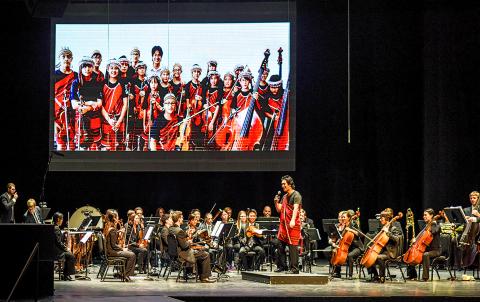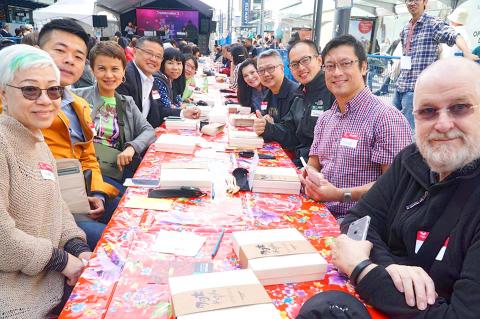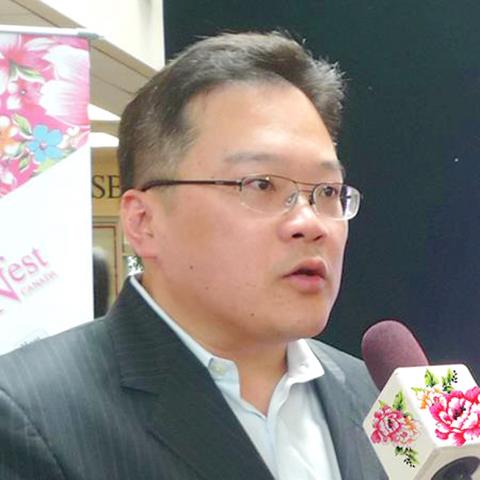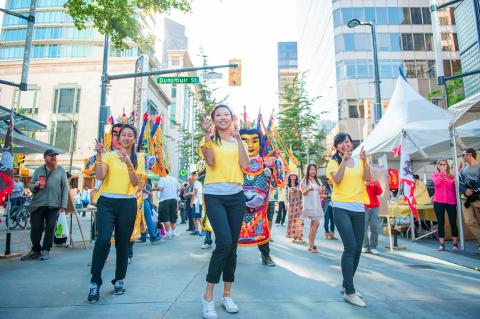Charlie Wu (吳權益) has been traveling to Taiwan for years to scout out musical talent, emerging designers and Aboriginal traditions for TaiwanFest (加拿大台灣文化節), an annual event in Toronto and Vancouver that kicks off at the end of next month.
Wu, the festival’s managing director, says the event has become wildly popularity — there were 150,000 visitors last year — due to the unique lineup of performers and delicacies.
Take the bento — a common boxed meal that made its way to Taiwan under Japan’s colonial occupation. Rather than simply selling the food item, TaiwanFest initiated the Friendship Bento, an event that matched 100 Taiwanese-Canadians with 100 others from a different background for a seated meal to encourage dialogue and learning.

Photo courtesy of TaiwanFest
“There are so many ways of presenting ourselves,” says artistic director Jessica Sung (宋浩芬). “The challenge is how to present something unique.”
This year, organizers will roll out the Dialogue with Asia series, starting with Taiwan’s “cultural tango” with Hong Kong in August.
“The evolution [of the festival] is the driving force. [We hope] future generations can enjoy something we leave for them,” Wu says in his office, which is adorned with family photos.

Photo courtesy of TaiwanFest
The legacy of their work is manifested in unexpected ways. Sung recalls the unlikely pairing of pop singer Rachel Liang (梁文音) and indie band Lang Hsin Band (嵐馨樂團) from Taitung for a concert collaboration at a previous TaiwanFest. Indie music bands outside of Taipei don’t always get as many opportunities in Taiwan, Sung says. Through sharing a stage in Canada, Liang discovered that one of the band members is her distant cousin from the same Aboriginal tribe. Their collaboration was captured in Liang’s follow-up album.
For Hsu Chian-li (許建立), festival director from 1998 to 2000, TaiwanFest has grown under Wu’s leadership because he brought it outdoors and expanded the musical genres. Hsu adds that the hundreds of volunteers have also been instrumental to the festival’s success.
TaiwanFest has recently partnered with Tzu Chi Foundation Canada (慈濟加拿大分會) and social enterprise Green Chair Recycling, putting a philanthropic and environmental spin to the festival.

Photo courtesy of TaiwanFest
For participants, the sight of numerous stations patrolled by efficient volunteer sorters is a memorable experience in itself. In 2014, after seeing thousands of guests over three days in Vancouver, Green Chair announced that with Tzu Chi Foundation, only three bags of garbage were produced.
Raymond Louie, Vancouver City Councilor and long-time supporter of TaiwanFest, says Taiwan and Canada share the same democratic values, entrepreneurship and ideas about gender equality.
“It’s about bringing people, families, from all areas of our city, all types of ages so they can come to a free family event and learn about culture, food, dance, music — and make friends. That’s why these types of festivals, especially TaiwanFest, are so important for our city.”

Photo courtesy of TaiwanFest
For more information, visit: www.taiwanfest.ca.

On April 26, The Lancet published a letter from two doctors at Taichung-based China Medical University Hospital (CMUH) warning that “Taiwan’s Health Care System is on the Brink of Collapse.” The authors said that “Years of policy inaction and mismanagement of resources have led to the National Health Insurance system operating under unsustainable conditions.” The pushback was immediate. Errors in the paper were quickly identified and publicized, to discredit the authors (the hospital apologized). CNA reported that CMUH said the letter described Taiwan in 2021 as having 62 nurses per 10,000 people, when the correct number was 78 nurses per 10,000

As we live longer, our risk of cognitive impairment is increasing. How can we delay the onset of symptoms? Do we have to give up every indulgence or can small changes make a difference? We asked neurologists for tips on how to keep our brains healthy for life. TAKE CARE OF YOUR HEALTH “All of the sensible things that apply to bodily health apply to brain health,” says Suzanne O’Sullivan, a consultant in neurology at the National Hospital for Neurology and Neurosurgery in London, and the author of The Age of Diagnosis. “When you’re 20, you can get away with absolute

May 5 to May 11 What started out as friction between Taiwanese students at Taichung First High School and a Japanese head cook escalated dramatically over the first two weeks of May 1927. It began on April 30 when the cook’s wife knew that lotus starch used in that night’s dinner had rat feces in it, but failed to inform staff until the meal was already prepared. The students believed that her silence was intentional, and filed a complaint. The school’s Japanese administrators sided with the cook’s family, dismissing the students as troublemakers and clamping down on their freedoms — with

As Donald Trump’s executive order in March led to the shuttering of Voice of America (VOA) — the global broadcaster whose roots date back to the fight against Nazi propaganda — he quickly attracted support from figures not used to aligning themselves with any US administration. Trump had ordered the US Agency for Global Media, the federal agency that funds VOA and other groups promoting independent journalism overseas, to be “eliminated to the maximum extent consistent with applicable law.” The decision suddenly halted programming in 49 languages to more than 425 million people. In Moscow, Margarita Simonyan, the hardline editor-in-chief of the